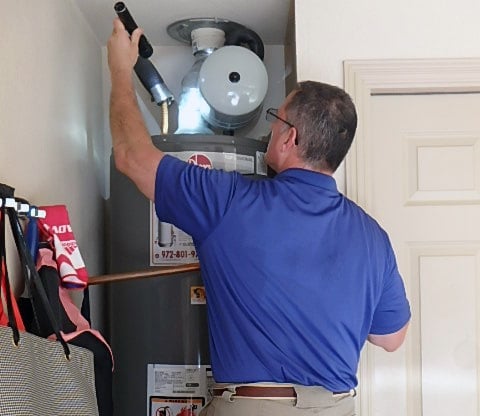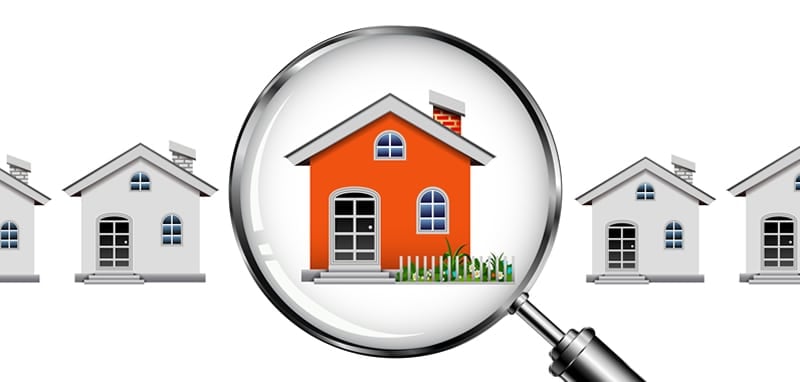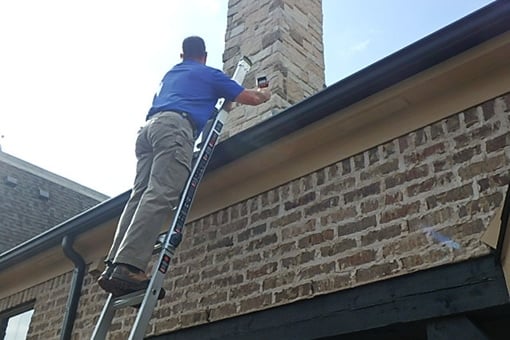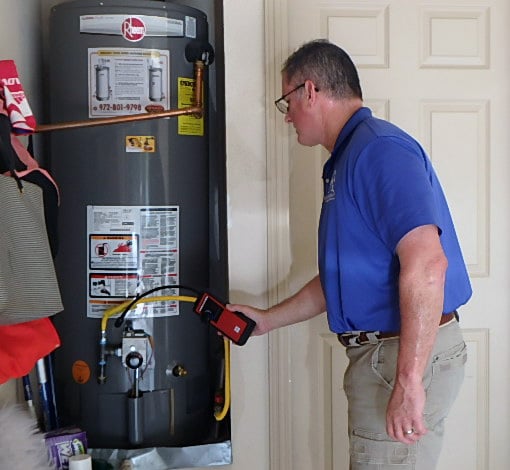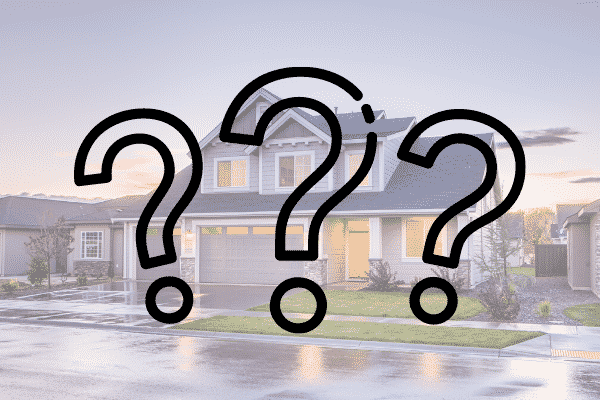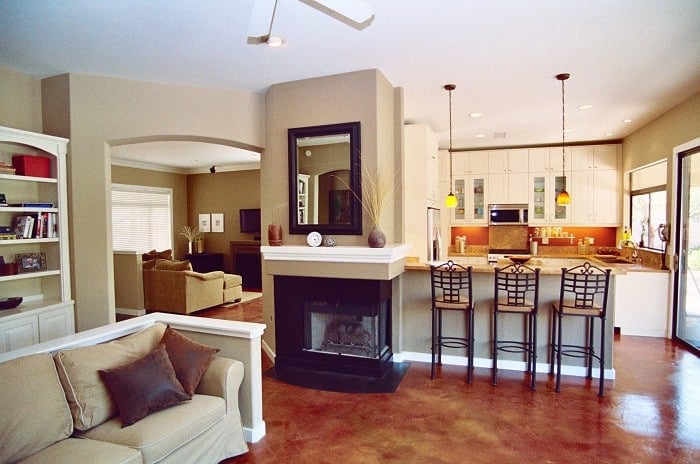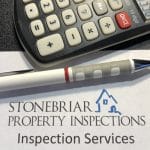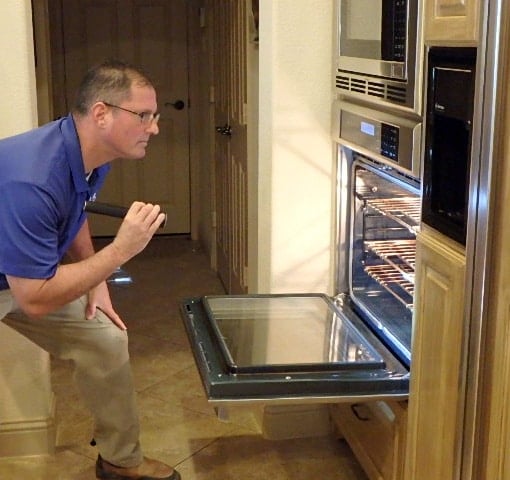By Keith Boggs
Updated April 18, 2024.
Did you know that it costs nearly $700,000 to buy a home in Frisco Texas in March 2024, which is trending down -2.1% year over year? The media listing home price per square foot is $256. Without a doubt, homes are the largest investment most people make in their lifetime. Given the ridiculously high costs, there are a lot of risks involved. You could spend a lot of money on the house with defects hidden under floors, behind walls, and even in the attic — prone to bugs like termites and ants.
A house could also have severe plumbing issues, electrical problems, structural instability, and water damages, among many others. Luckily, you can avoid all these problems through a home inspection. Investing in a home inspection is as valuable as investing in a good home. Compared to buying a home, home inspection costs are relatively small.
Home Inspection Costs in Spring 2024
A good home inspection will cost you less than $1,000, with most of them set at around $600. Imagine spending only $600, you save money that could amount to thousands of dollars in defects. For that reason, it is vital to know the importance of home inspection and what it entails. Here is what we think you should know.
What Is A Home Inspection?
As its name suggests, a home inspection is simply a thorough check done by a licensed and trained professional home inspector. Home inspectors perform a comprehensive examination to identify any problems or potential issues. They will examine plumbing and electrical systems, safety features, HVAC components, insulation, windows, doors, and much more. They then provide a detailed report on the house’s condition and any possible issues that could arise with time.
As a home buyer, you are allowed to include an inspection report in your offer and request repairs or terminate the offer altogether. All this will depend on the information provided by the home inspection officer.
Costs: How Much Does a Home Inspection Cost?
For homes in Plano, Frisco, Dallas, Fort Worth, Texas, and other surrounding areas, home inspection costs around $500-$700. This amount is not fixed, because you could pay way less. However, it is not good to go for extremely cheap home inspection services because they might not be thorough. Remember that you get what you pay for.
The cost of a home in the populated North Texas area is around $500,000; this makes it even more necessary to invest in a home inspection professional. By getting an experienced and skilled home inspector, you could save thousands of dollars in the long run. But how do home inspectors arrive at the cost of a home inspection? The following section answers this question in detail! Read on to understand more. Here’s more details:
- Home Inspection Costs: The typical cost of a home inspection in Plano, Frisco, Dallas, Fort Worth, and surrounding areas is in the range of $500 to $700. This range can vary based on factors such as the location, the size and age of the home, and the level of detail included in the inspection. The variation in cost highlights the importance of doing some research and obtaining multiple quotes to find a reputable inspector within your budget.
- Quality vs. Cost: While it may be tempting to opt for a cheaper home inspection service to save money, it’s essential to be cautious. Extremely low-cost services might not provide the thorough inspection that is necessary to uncover potential issues with the property. A home inspection is an investment in your future, and cutting corners on this step can lead to costly surprises down the road. The phrase “you get what you pay for” is particularly relevant in this context, as a comprehensive inspection can save you money and headaches in the long run.
- Value of a Home Inspection: Considering the high cost of homes in North Texas, where the average home price is around $500,000, a professional home inspection becomes even more vital. Here’s why:
 Uncover Hidden Issues: A skilled home inspector can identify both visible and hidden problems with the property, such as structural issues, electrical problems, plumbing leaks, or pest infestations. This knowledge can help you negotiate with the seller for repairs or a reduction in the purchase price.
Uncover Hidden Issues: A skilled home inspector can identify both visible and hidden problems with the property, such as structural issues, electrical problems, plumbing leaks, or pest infestations. This knowledge can help you negotiate with the seller for repairs or a reduction in the purchase price. Peace of Mind: A thorough inspection provides peace of mind for the homebuyer. Knowing the condition of the property allows you to make an informed decision, and it reduces the risk of buying a home with unexpected problems.
Peace of Mind: A thorough inspection provides peace of mind for the homebuyer. Knowing the condition of the property allows you to make an informed decision, and it reduces the risk of buying a home with unexpected problems. Cost Savings: While the upfront cost of an inspection may seem significant, it’s a small price to pay when you consider the potential savings. Uncovering major issues before closing on a home can save you thousands of dollars in repair and renovation costs.
Cost Savings: While the upfront cost of an inspection may seem significant, it’s a small price to pay when you consider the potential savings. Uncovering major issues before closing on a home can save you thousands of dollars in repair and renovation costs.
- Factors Influencing Inspection Costs: Home inspectors arrive at their pricing based on several factors, which might include:
 Size of the Property: Larger homes often require more time and effort to inspect, which can result in higher costs.
Size of the Property: Larger homes often require more time and effort to inspect, which can result in higher costs. Age and Condition: Older homes or properties in poor condition may necessitate more thorough inspections, potentially increasing the cost.
Age and Condition: Older homes or properties in poor condition may necessitate more thorough inspections, potentially increasing the cost. Location: Inspections in different regions may vary in price due to varying demand, local regulations, and the cost of living.
Location: Inspections in different regions may vary in price due to varying demand, local regulations, and the cost of living. Additional Services: Some inspectors offer specialized services, such as radon testing or mold inspections, which can increase the overall cost.
Additional Services: Some inspectors offer specialized services, such as radon testing or mold inspections, which can increase the overall cost.
Investing in a professional home inspection is a wise decision, especially when purchasing a home in areas with high property values like North Texas. While costs can vary, it’s crucial to prioritize the quality and thoroughness of the inspection over the price. This investment can save you money and provide peace of mind throughout the home buying process.
What Are the Factors Influencing Home Inspection Price?
As mentioned earlier, the cost of a home inspection ranges from $500 to $1000. However, you can still get a decent home inspection report for less than $500. In fact, the average cost of home inspection in most states is $473. Various factors influence the cost of home inspection. For instance, the location of a home, its size, and age directly influence the home inspection cost.
In most parts of the country, home inspections costs vary depending on the current market status, weather, and the number of available inspectors. Undoubtedly, location plays a vital role in determining the home inspection cost. For instance, in Austin, Texas, it costs $450, while it costs $1,020 in New York City. The same services cost $325 in Detroit, Michigan. Therefore, you need to consider the location of a home when estimating its inspection cost.
The size of a home also plays a crucial role in determining inspection costs. Many home inspectors offer base rates by square footage, with some basing their rates on footage range. In simple terms, the larger the home, the more money you will spend on inspection. The same analogy also applies to the age of a home.
Inspectors tend to charge more for older homes than newer ones. This is because older homes require more time and evaluation due to the high probability of defects. The inspector will take a lot of time evaluating the home’s wiring and plumbing system to determine whether there is any problem. With older homes, inspectors will have to spend more time to ensure that they don’t overlook any problem. Therefore, if you intend to buy an old home, be sure to discuss it with your inspector to see if there will be additional costs.
Some other factors could also impact the home inspection cost. For instance, the rates might vary depending on the home’s location — a travel fee might be included outside the inspector’s service area. Additional travel fees may be included if an inspector travels to the site and finds that the house is not “inspection-ready.” The same applies if the combinations and various keys to the house have not been provided. The inspector’s final estimate may or may not include reinspecting defects that the seller agrees to fix.
You must understand the services your home inspector provides for the best results. You can even ask questions to get a better understanding of the whole thing to further understand the cost of a home inspection. Some of the questions you can ask include;
 What will you and will you not inspect?
What will you and will you not inspect? How is a home inspection performed, and how does it take?
How is a home inspection performed, and how does it take? Will you recommend repairs?
Will you recommend repairs?
How Long Does a Home Inspection Take?
Before a home inspection process, you first need to pick your home inspector and wait for them to be available. There are usually delays in inspection, especially when you buy a home in a hot real estate market. Your realtor will also have to determine an ideal time for the inspection because the homework should not be present during the process. Therefore, you are advised to start the process of picking a home inspector immediately you realize you will need one — this helps reduce the delay time.
A home inspection takes around two to three hours to complete. This depends on the scale of inspection and the size of the home. There are several other factors that could lengthen the home inspection process. For instance, when there are multiple HVAC units, it could take more time to inspect them. Cases of special inspections that need data taken to a laboratory might also prolong the inspection. However, once the inspection is complete and necessary lab results are returned, the home inspector will compile a report detailing all the findings and possible recommendations. They will go over the report with you to ensure you understand every point. In most cases, the report is presented within 24 to 48 hours.
Various factors can influence the timeline and cost of a home inspection
Keep in mind that various factors that can influence the timeline and the cost of a home inspection:
- Scheduling a Home Inspection: As a prospective home buyer, you first need to select a qualified home inspector and then schedule an inspection. In hot real estate markets where homes are in high demand, there may be delays in securing an inspection appointment. Realtors and home buyers often work together to find an ideal time for the inspection, ensuring that the homeowner is not present during the process to allow for an unbiased examination. Therefore, it’s advisable to initiate the process of selecting a home inspector as soon as you know you’ll require one, as this can help reduce potential delays.
- Duration of a Home Inspection: A typical home inspection usually takes around two to three hours to complete. The specific time can vary based on a variety of factors, including:
 Size of the Home: The larger the home, the longer the inspection is likely to take. Inspecting more square footage, additional rooms, and multiple levels can extend the overall time.
Size of the Home: The larger the home, the longer the inspection is likely to take. Inspecting more square footage, additional rooms, and multiple levels can extend the overall time. Scope of Inspection: The extent of the inspection also plays a role. Some home buyers opt for more comprehensive inspections, which may cover additional aspects like outbuildings, pools, or other features. These extras can lengthen the inspection process.
Scope of Inspection: The extent of the inspection also plays a role. Some home buyers opt for more comprehensive inspections, which may cover additional aspects like outbuildings, pools, or other features. These extras can lengthen the inspection process. Complexity of Systems: If the property has multiple HVAC (heating, ventilation, and air conditioning) units, complex electrical systems, or intricate plumbing, the inspector may require more time to thoroughly assess these systems.
Complexity of Systems: If the property has multiple HVAC (heating, ventilation, and air conditioning) units, complex electrical systems, or intricate plumbing, the inspector may require more time to thoroughly assess these systems. Specialized Inspections: Sometimes, specific inspections may be necessary, such as testing for radon, mold, or lead paint. These specialized tests can add time to the overall inspection process.
Specialized Inspections: Sometimes, specific inspections may be necessary, such as testing for radon, mold, or lead paint. These specialized tests can add time to the overall inspection process. Laboratory Testing: When samples or data need to be collected during the inspection and sent to a laboratory for analysis, this can significantly extend the duration. For instance, if water samples are taken for analysis, it might take some time to receive the results.
Laboratory Testing: When samples or data need to be collected during the inspection and sent to a laboratory for analysis, this can significantly extend the duration. For instance, if water samples are taken for analysis, it might take some time to receive the results.
- Inspection Report and Timeline: Once the home inspection is complete, the inspector compiles a detailed report that outlines all findings, including any issues or concerns with the property. This report typically includes photographs and descriptions of the areas inspected, along with any recommendations for necessary repairs or improvements. The inspector will then go over this report with the home buyer to ensure they understand all the points. In most cases, the final inspection report is delivered within 24 to 48 hours after the inspection, but this timeline can vary based on the inspector’s workload and the complexity of the report.
The time it takes to complete a home inspection, which influences the cost of the home inspection, can vary based on multiple factors, including the size and complexity of the property, the extent of the inspection, and any specialized tests that may be required. It’s crucial for home buyers to plan ahead, schedule inspections promptly, and be patient during the process to ensure a thorough evaluation of the prospective home’s condition.
What Sort of Issues Does a Home Inspector Look For?
A home inspector does a thorough examination and evaluation of major structures and systems in your home. In fact, according to the International Association of Certified Home Inspectors (IACHI), there are over 1,600 individual items that inspectors should examine. During the inspection, they don’t focus on cosmetic damage but rather on signs of serious damage like building code damage or an underlying structural defect. These are the crucial details that will help identify a real home value. Even though we cannot list every item that inspectors examine, here are some of the major areas they cover.
Interior Home Inspection
A home interior is one of the crucial areas that inspectors focus on. They inspect every room for signs of defects, such as leaning walls or unstable flooring. Besides, they examine possible water damage from potential leaks and ensure that there is sufficient insulation. Proper ventilation is also assessed when inspectors are dealing with the interior of a home.
Exterior Home Inspection
After the interior is examined thoroughly, the home inspector will turn to the home exterior. These areas include the home’s main structure, windows, roof, and doors. They also evaluate the house for possible signs of foundation problems by looking for rot or cracks in the masonry or siding. On the roof, they will thoroughly examine the gutters and shingles for any signs of leaking or damage. The same is also done to chimneys and skylights. This helps paint an accurate picture of the home’s condition.
Yard Inspection
The yard is another essential area that inspectors examine. The home inspector will carefully evaluate the grounds to ensure that there is no stagnant water or possible drainage problems. They will also focus on retaining walls, downspouts, posts or rails, and other pathways to check for any signs of structural problems or damage. Some inspectors also evaluate the landscaping and record the state of bushes and trees.
Kitchen and Bathrooms Inspection
The kitchen and bathrooms form an essential part of a home. In these areas, the inspector focuses on ensuring all electrical outlets are grounded as required and there are no leaks in the sink. They also check whether there are any signs of water damage in the kitchen. Then, they check to ensure that all showers and faucets are working properly in the bathroom. In the kitchen, more checks are done to ensure that the drawers and cabinets are functional and that the vent hood is safely connected outside. Inspectors also focus on ensuring all the appliances in the kitchen are working as expected.
Systems and Plumbing Inspection
A home inspector does a comprehensive evaluation of all the electrical wiring and systems to ensure they are working properly and are up to code. They also ensure that these systems don’t present any possible hazards. The evaluation includes things like light switches, wiring, outlets, and HVAC systems. Besides, they do a thorough evaluation of the plumbing system, including all drains, pipes, and water heater. They do the same on temperature and water temperature to ensure everything is working properly.
Who Should Pay for a Home Inspection?
The buyer is responsible for paying for the home inspection. However, this is negotiable, and the home inspection fees can be included in the closing costs in case the seller agrees. One important thing to note is that the buyer should be the one selecting the home inspector, be involved in the inspection process, and get an initial review. Homebuyers take on a significant risk by investing in a house and land they know so little about. This is why they need a home inspector to help them see things they could have missed on their own. Home inspectors play a vital role by informing the buyer of any underlying conditions that could influence that cost.
As a home buyer, you should also know that the seller could choose to do a pre-listing inspection at their expense to help identify potential defects. They do so with the aim of fixing these defects before putting the house up for sale. If they do the pre-listing inspection, the law requires sellers to share the results with potential buyers. Therefore, as a buyer, you should ensure that you have access to the pre-listing inspection report. Getting this information will ensure that you are making a wise decision based on accurate details. It also prevents investing in a faulty home that could be unsafe to live in.
How Do You Choose a Good Inspector?
There is no point in doing a home inspection when you are dealing with an inexperienced and unlicensed home inspector. It is vital to ensure that your preferred inspector is licensed and equipped with tools to perform the inspection. Experience is also vital for the best results. For better reference, talk to friends who recently bought a home or got referrals to ideal home inspectors. You can also talk to your realtor for further assistance. If you want to get more details, you can check online reviews and see if you can get a reputable inspector.
When looking for a home inspector, you should interview them and understand how they work. For instance, you can ask questions regarding their years of experience and certification. Feel free to inquire about their home inspection process and the areas they tend to focus on. If you find them suitable for the role, start talking to them about the specific home you want to be inspected.
Getting to know the inspection services they offer is also very important. For instance, when inspecting the roof, you should ensure they have all the necessary tools to perform a thorough home inspection. They also are able to do what you are requesting. At any stage of communication, they should be accommodating and knowledgeable. Avoid dealing with inspectors that cannot find time to answer your questions or concerns. If a home inspector doesn’t have time to answer your calls or email, find another that can communicate regularly and openly.
Remember that you are not hiring a company but hiring an individual. This is because established home inspection firms hire new inspectors with little to no experience in the field. Therefore, just because you are hiring from a reputable firm doesn’t mean that you are hiring a good inspector. Ensure that the inspector has sufficient experience, especially with inspections in North Texas, to get the most of home inspection. Working with an inspector that understands the demographics of a local area comes with great advantages. Therefore, invest in a skilled home inspector with vast experience!
Can You Attend the Home Inspection?
We recommend that you attend the home inspection and have your realtor attend as well. Having your realtor attend the inspection is beneficial due to various reasons. For instance, realtors have experience with home inspections and can help you tell the difference between recommended upgrades and major issues. During the inspection, you could be receiving lots of information that can be quite confusing — the realtor will elaborate it for you.
It is a good idea to come prepared with a list of concerns or questions you might have for the inspector. To get the right questions, research other homes with similar specifications and the potential issues they might have. For convenience, you should get in touch with your inspector before time and raise any concerns you might have. You could also inform them of the areas you would like them to focus on.
Upon finishing the inspection process, the inspector should walk you through the process and explain every detail. At this point, feel free to ask any questions you might have — don’t limit yourself to anything; ask about everything you don’t understand. While the inspection could be concluded at that point, a good inspector makes a follow-up call around 48 hours after they deliver the report to see whether you have any questions.
Their job is walking you through the whole process and ensuring you understand every detail! They also help ensure you are making an investment decision based on accurate and reliable information. This helps prevent unnecessary losses and the possibility of investing in a home with poor living conditions.
Home Inspection vs. Home Appraisal
When it comes to buying or selling a property, there are two important steps that both buyers and sellers need to consider: a home inspection and a home appraisal. While these two terms are often used interchangeably, they serve different purposes in a property transaction.
Understanding the differences between a home inspection and a home appraisal
A home inspection is a detailed examination of the physical condition of a property. It aims to identify any potential issues or problems that may exist in the house, such as structural defects, plumbing or electrical issues, water damage, and more. Home inspectors are trained professionals who thoroughly inspect the property and provide a report highlighting their findings. They play a crucial role in helping buyers make an informed decision about the condition of the property before finalizing the purchase. On the other hand, a home appraisal is an assessment of the property’s value. It is conducted by a licensed appraiser who evaluates various factors such as the property’s location, size, condition, recent sales of similar properties in the area, and market trends. The purpose of a home appraisal is to determine the fair market value of the property. Lenders often require a home appraisal to ensure that the property is worth the amount of money being borrowed.
Discussing the necessity and cost of each in a property transaction
While a home inspection is not always mandatory, it is highly recommended for buyers to have one. A thorough home inspection can uncover hidden issues that may not be visible to an untrained eye, potentially saving buyers from costly surprises later on. The cost of a home inspection can vary depending on factors such as the size of the property, its location, and the complexity of the inspection. On average, a home inspection can cost anywhere from a few hundred to a thousand dollars. On the other hand, a home appraisal is typically required by lenders when financing a property purchase. The cost of a home appraisal can also vary based on similar factors to a home inspection. It generally ranges from a few hundred to a few thousand dollars. While buyers are often responsible for paying for the home inspection, the cost of a home appraisal is usually borne by the buyer. Both a home inspection and a home appraisal provide valuable information to buyers and sellers. A home inspection helps buyers make an informed decision about the condition of the property, while a home appraisal helps determine its market value. While the costs associated with both vary, they are important investments in ensuring a smooth and informed property transaction.
Additional Inspection Costs
When it comes to a comprehensive home inspection, there are several additional inspections that you may need to consider. These specialized inspections can provide a more thorough evaluation of specific aspects of your home, but they do come with their own associated costs.
Specialized inspections and their associated costs
 Pest inspections: Pest inspections are important for assessing any potential termite damage or infestations. The cost for a pest inspection typically ranges from $100 to $300, depending on the size and location of the property.
Pest inspections: Pest inspections are important for assessing any potential termite damage or infestations. The cost for a pest inspection typically ranges from $100 to $300, depending on the size and location of the property. Structural assessments: Structural assessments are crucial for identifying any structural issues or weaknesses in the home. The cost for a structural assessment can vary significantly, starting from $300 and going up to $1,000, depending on the complexity of the inspection.
Structural assessments: Structural assessments are crucial for identifying any structural issues or weaknesses in the home. The cost for a structural assessment can vary significantly, starting from $300 and going up to $1,000, depending on the complexity of the inspection. Electrical and plumbing evaluations: Evaluations of the electrical and plumbing systems are essential to determine their overall condition and potential issues. The cost for an electrical or plumbing evaluation can range from $100 to $500, depending on the size and complexity of the systems.
Electrical and plumbing evaluations: Evaluations of the electrical and plumbing systems are essential to determine their overall condition and potential issues. The cost for an electrical or plumbing evaluation can range from $100 to $500, depending on the size and complexity of the systems.
Clarifying if these services are included in the base price or separately charged
It’s important to clarify with us whether these specialized inspections are included in the base price or if they will be separately charged. Some home inspection companies may offer all-inclusive packages that include these additional inspections, while others may charge an additional fee for each specialized inspection. Before proceeding with the home inspection, make sure to discuss these details with us and understand the cost implications associated with any additional inspections you may require. This will help you budget accordingly and ensure a thorough evaluation of your property.
Home Inspection Is as Valuable as the Home Itself
A home inspection is vital for any home buying process. By getting a reliable home inspector, you have the key to ensuring you make the right home investment decision. If you have any questions regarding home inspection and what it entails, contact us.


